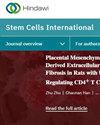脂肪源性间充质干细胞通过Jagged-1/Notch-1/Hes信号通路促进造血干细胞增殖
IF 3.8
3区 医学
Q2 CELL & TISSUE ENGINEERING
引用次数: 0
摘要
背景。移植功能差(PGF)是造血干细胞移植(HSCT)后危及生命的并发症。目前的治疗方法,如CD34+细胞输注,已经显示出有限的效果。相反,间充质干细胞(MSCs)显示出解决PGF的潜力。脂肪来源的间充质干细胞(ADSCs)有效地支持长期造血干细胞增殖。因此,本研究旨在探讨ADSCs提供长期造血支持的机制。方法。从小鼠中分离ADSCs并随后进行鉴定。体外实验将ADSCs与小鼠的Lin-Sca-1+c-kit+ (LSK)细胞共培养2周和5周。共培养后定量LSK细胞数量。利用扫描电镜观察ADSCs与LSK细胞的相互作用。采用western blot和实时定量PCR检测Hes-1的表达。用γ-分泌酶抑制剂(GSI)证实Jagged-1/Notch-1/Hes-1通路参与LSK细胞扩增。此外,Jagged-1在adsc中被敲除,以证明其在adsc介导的造血支持中的重要性。通过体内实验分别研究了LSK、LSK +成纤维细胞和LSK + ADSCs对ADSCs的造血支持作用。监测小鼠存活率、血小板计数、白细胞计数和血红蛋白水平。结果。ADSCs高表达jagged -1,促进LSK细胞增殖。ADSCs与LSK细胞之间存在直接相互作用。共培养后,hes1在LSK细胞中的表达增加。此外,gsi降低了LSK细胞的增殖和hes1的表达。Jagged-1的敲除减弱了adscs介导的LSK细胞增殖促进。此外,ADSCs促进造血功能恢复,促进NOD/SCID小鼠的存活。结论。ADSCs在体内和体外提供的造血支持可能至少部分是通过Jagged-1/Notch-1信号通路介导的。这些发现为adscs介导的造血支持机制提供了有价值的见解,并可能对改善HSCT后PGF的治疗具有启示意义。本文章由计算机程序翻译,如有差异,请以英文原文为准。
Adipose-Derived Mesenchymal Stem Cell Facilitate Hematopoietic Stem Cell Proliferation via the Jagged-1/Notch-1/Hes Signaling Pathway
Background. Poor graft function (PGF) is a life-threatening complication following hematopoietic stem cell transplantation (HSCT). Current therapies, such as CD34+ cell infusion, have shown limited effectiveness. Conversely, mesenchymal stem cells (MSCs) show potential in addressing PGF. Adipose-derived mesenchymal stem cells (ADSCs) effectively support long-term hematopoietic stem cell proliferation. Therefore, this study aimed to investigate the mechanisms underlying the long-term hematopoietic support provided by ADSCs. Methods. ADSCs were isolated from mice and subsequently identified. In vitro experiments involved coculturing ADSCs as feeders with Lin-Sca-1+c-kit+ (LSK) cells from mice for 2 and 5 weeks. The number of LSK cells was quantified after coculture. Scanning electron microscopy was utilized to observe the interaction between ADSCs and LSK cells. Hes-1 expression was assessed using western blot and real-time quantitative PCR. An γ-secretase inhibitor (GSI) was used to confirm the involvement of the Jagged-1/Notch-1/Hes-1 pathway in LSK cell expansion. Additionally, Jagged-1 was knocked down in ADSCs to demonstrate its significance in ADSC-mediated hematopoietic support. In vivo experiments were conducted to study the hematopoietic support provided by ADSCs through the infusion of LSK, LSK + fibroblasts, and LSK + ADSCs, respectively. Mouse survival, platelet count, leukocyte count, and hemoglobin levels were monitored. Results. ADSCs showed high-Jagged-1 expression and promoted LSK cell proliferation. There was a direct interaction between ADSCs and LSK cells. After coculture, Hes-1 expression increased in LSK cells. Moreover, GSI-reduced LSK cell proliferation and Hes-1 expression. Knockdown of Jagged-1 attenuated ADSCs-mediated promotion of LSK cell proliferation. Furthermore, ADSCs facilitated hematopoietic recovery and promoted the survival of NOD/SCID mice. Conclusion. The hematopoietic support provided by ADSCs both in vivo and in vitro may be mediated, at least in part, through the Jagged-1/Notch-1 signaling pathway. These findings provide valuable insights into the mechanisms underlying ADSCs-mediated hematopoietic support and may have implications for improving the treatment of PGF following HSCT.
求助全文
通过发布文献求助,成功后即可免费获取论文全文。
去求助
来源期刊

Stem Cells International
CELL & TISSUE ENGINEERING-
CiteScore
8.10
自引率
2.30%
发文量
188
审稿时长
18 weeks
期刊介绍:
Stem Cells International is a peer-reviewed, Open Access journal that publishes original research articles, review articles, and clinical studies in all areas of stem cell biology and applications. The journal will consider basic, translational, and clinical research, including animal models and clinical trials.
Topics covered include, but are not limited to: embryonic stem cells; induced pluripotent stem cells; tissue-specific stem cells; stem cell differentiation; genetics and epigenetics; cancer stem cells; stem cell technologies; ethical, legal, and social issues.
 求助内容:
求助内容: 应助结果提醒方式:
应助结果提醒方式:


